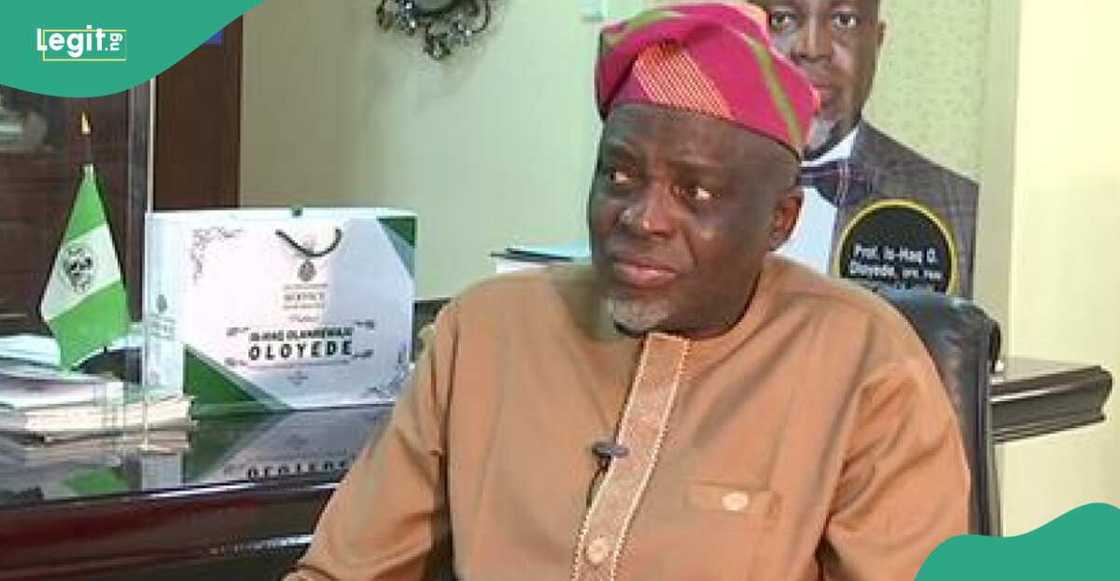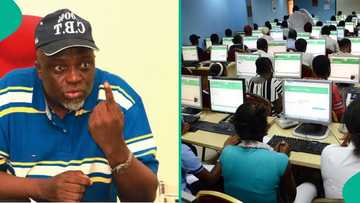FULL LIST: JAMB Identifies States with Highest UTME Malpractice Cases, Anambra Tops List
- Anambra and Lagos states recorded the highest number of malpractice cases in the just-concluded UTME, with 14 and 9 suspects arrested, respectively
- JAMB uncovered new cheating tactics, including biometric manipulation, impersonation, and illegal mobile phone use during the exam
- The board is investigating 80 suspects across six states and has vowed to tighten security and prosecute offenders
The Joint Admissions and Matriculation Board (JAMB) has disclosed that Anambra and Lagos recorded the most incidents of malpractice during the recently concluded Unified Tertiary Matriculation Examination (UTME).
Speaking at a media briefing over the weekend, JAMB Registrar, Prof. Ishaq Oloyede, revealed that 80 individuals have so far been apprehended for various exam-related offences across the country. Anambra led the list with 14 suspects, closely followed by Lagos with nine.

Source: Facebook
Anambra tops the list
According to Oloyede, the offences ranged from impersonation and possession of prohibited devices to biometric fraud and collusion with Computer-Based Test (CBT) centres.
“In Anambra alone, we recorded 13 cases of impersonation and one incident involving mismatched photographs,” he stated.
Lagos was not far behind, with its suspects caught for impersonation, spying, and carrying mobile phones into the examination halls—violations JAMB has repeatedly warned against.
Other states on the malpractice list include Delta, Kano, Kaduna, and Rivers, each reporting between six and eight cases. Delta recorded eight incidents, while Kano and Kaduna followed with seven and six, respectively.
CBT centres complicit in malpractice scheme
Oloyede disclosed that the scope and sophistication of the cheating tactics used this year point to a disturbing trend.
“We encountered biometric manipulation, the use of combined thumbprints between candidates and their impersonators, and cases of double registration,” he said.
He further revealed that these acts were not isolated but carried out in connivance with some CBT centre operators.

Source: Twitter
One of the more unusual cases, according to JAMB, involved a blind candidate who allegedly recruited a fellow blind undergraduate to take the exam in his place—a move the board described as both desperate and disheartening.
JAMB has reiterated its commitment to upholding the integrity of the UTME, with Oloyede affirming that all suspects are currently undergoing investigation and will face appropriate legal actions. The board says it is working to close loopholes and strengthen its systems to prevent future occurrences of exam malpractice.
This year’s revelations have raised serious concerns about the integrity of the examination process in some regions, with education stakeholders calling for stricter oversight and more robust technological safeguards.
What causes exam malpractice in Nigeria?
Widespread examination malpractice in Nigeria is eroding the quality of education and producing graduates lacking essential skills, according to a study by academic researcher Sylvanus Ushie of Cross River University of Technology.
The study, “Examination Malpractice: Causes, Effects and Possible Ways of Curbing the Menace,” identified societal values, poor student preparation, and inadequate learning facilities as the primary drivers of cheating during exams.
Defined as deliberate wrongdoing aimed at securing an unfair advantage, examination malpractice has become a persistent challenge across Nigeria’s academic institutions. Common forms include question paper leaks, impersonation, smuggling of materials, copying, and collusion.
Ushie noted that the societal emphasis on certificates over actual competence has created a toxic value system, encouraging students to seek shortcuts rather than genuine academic achievement. Contributing factors also include laziness, economic hardship, weak parental guidance, and insufficient school infrastructure.

Read also
UTME 2025 mass failure: JAMB takes major action as over 8000 students blame technical glitches
“The problem is further compounded by political interference and the commercialisation of education, which diminishes accountability and raises incentives for malpractice,” the study stated.
The consequences, according to the research, are far-reaching. They include the emergence of ill-prepared graduates, diminished student confidence, and a normalisation of fraud that could lead to broader criminal behaviour in society.
To combat the trend, the study recommends shifting educational focus from certificates to practical skills, enhancing basic education standards, enforcing bans on mobile phones in examination halls to reduce e-cheating, and promoting a culture of integrity among teachers, administrators, and policymakers.
Ushie reiterated that without systemic reforms, the integrity of Nigeria’s education sector remains at risk.
JAMB candidates who would be barred
Meanwhile, Legit.ng reported that JAMB stressed that candidates whose biometric verification is unsuccessful on the examination day would not be permitted to sit the UTME or its mock version.
JAMB noted that no parent or proxy is allowed to make any transaction on candidates' profiles or interfere with the registration "to avoid alterations and data mismatch".

Read also
Tee Dollar, Tobi Nation jailed for naira abuse, their mugshot trend: "Poor man pikin dey suffer
Legit.ng's head of politics and current affairs desk, Nurudeen Lawal, contributed insights from a research study on exam malpractice in Nigeria to this report.
Source: Legit.ng



